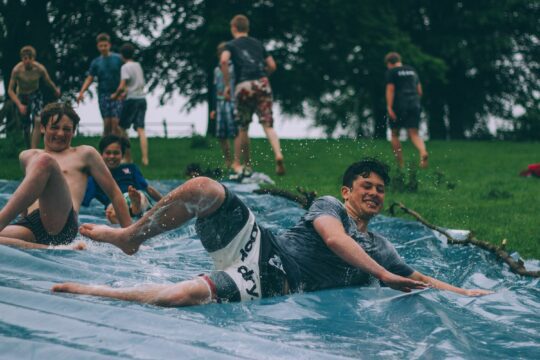The air is full of laughter. Squeals of delight ring out as a young boy rides a bicycle that is way too big for him.
9 year old Anseed is teetering precariously close to disaster as he wobbles down the lane but somehow he manages to stay upright and brake at the last moment before jumping nimbly to one side and wrestling his bike to a standstill. The whole family are in the street calling words of advice, gesticulating wildly with their hands and roaring with laughter as Anseed stands there dwarfed by his new toy.
Sabri, cousin and best friend, is not as co-ordinated as Anseed and, has fallen off his bike over half a dozen times. But he persists. Eventually, sheer determination with a healthy measure of good humour prevail and finally makes the length of the lane. The cheers from the crowd are deafening. Sabri’s face is awash with pride and joy.
The new bikes have been chosen to last for many years and are hence dangerously too big for their riders. Here, in Sri Lanka, bikes, like most other things are one-off purchases. These bikes will are a treasured possession; ridden daily.
Anseed and Sabri, born into a poor west Sri Lankan fishing village which lost everything including two young children during the Tsunami, have never owned bicycles. They have never played PlayStation or Xbox. They don’t know how to use a computer. They sleep on a plastic mat on the floor. They use a discarded old piece of timber as a cricket bat. Despite all or arguably because of it, Anseed and Sabri are a couple of the happiest, brightest, well-behaved boys I have ever met!
I am staying with Anseed and Sabri’s family as part of some relief work I have been doing in Sri Lanka with their family since the Tsunami. They wake with energy and smiles on their faces. They help out around the house and then play outside until dark. The family is close. They eat each meal together and, not having TV or other digital devices, spend time talking and sharing.
I often witness boys in the West who have every toy and privilege imaginable and yet are always wanting more, constantly fighting with their siblings and unwilling to assist with household chores.
I pondered what would it be like if we went back to a time without computers and electronic gadgetry? What if our lives were not so hectic, in the race to provide well for our families, that we had more time to spend sharing and story telling with our children? Of course, this is not any of our current realities, is it?
I’m sure you’ll agree that decrease in family time, the pervasive nature of the digital world and our busy lives as parents is having a negative effect on our children.
So what can we do?
Here are a couple of simple recommendations:
1) Set strict boundaries around the use of electronic equipment
When children are young, set strict boundaries around how much time they spend using electronic devices, and make sure those boundaries are adhered to. Really encourage your children to pursuits that utilise their own personal creativity, for example, art, music or even just playing with simple toys and making up their own story around what they are doing.
2) Spend one-on-one time with your child
Find something you enjoy doing with each of your children and make sure you spend regular time doing it. Examples could be reading together before bed, playing chess, kicking a ball in the park or even cooking.
3) Eat meals together
Try to eat as many meals as possible together with no distractions like television and just talk about what you have all been doing.





